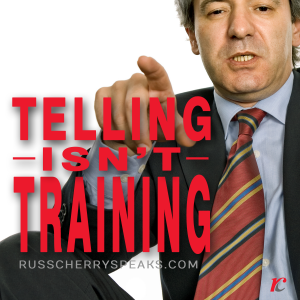 I work with lots of organizations as a consultant, coach, and trainer. Fortune 25 companies, small businesses and everything in-between including government, healthcare, non profit, and schools/universities. I get hired to grow people and implement change.
I work with lots of organizations as a consultant, coach, and trainer. Fortune 25 companies, small businesses and everything in-between including government, healthcare, non profit, and schools/universities. I get hired to grow people and implement change.
One of the greatest barriers to lasting change t is training. Now, you might be saying “Russ, training is how we implement change and deliver growth.” In theory you are correct. Application is another matter.
What I have found in every organization (large and small) is people saying words to others and calling it training. They tell people what to do and how to do it and say “good enough.”
That’s usually when I get called – the initiative has failed and they need help.
Here are some tips to help you train for positive change and growth.
TELL – Information must be communicated to those who will carry out the new initiative, process, or program. Be sure to cover different learning styles. People learn differently.
- Auditory – some people learn by listening (smallest group)
- Visual – some people learn by watching/seeing
- Kinesthetic – most people learn by doing
You will get better implementation, execution, and lasting results if you tell better.
SHOW – Lots of “tellers” (aka trainers) tell people how to do things and then ask the learners if they get it. Nobody wants to look stupid so they say, “Yep. Got it boss.” Have you ever said you got it and then went to the computer or workbench bewildered by what to do next? Make sure you show/demonstrate how to do “it”.
To make sure training is retained make the learner do “it” and show the process back to you. Repeat! Repeat! Repeat!
DO – People need time to learn, understand and apply a new skill or task (physical, mental, or virtual). They need a safe space to fail and seek advice/correction. This is, in my opinion, the biggest pitfall organizations face in training. They don’t give enough time to safely do and do better.
You may be saying, “Russ, I don’t have time for this.” I agree. I would respond with, “You must make the time.”
Taking the time early on reduces errors, increases confidence, and eliminates the need for retraining or worst of all – starting over!
Training done right is an upfront investment that pays big in the end. Your business–and your team members–will achieve far greater success when you take the time to train instead of tell.
The post Are You Training or Just Telling? appeared first on Russ Cherry, Speaker & Consultant.
Source: Russ Cherry Speaks
